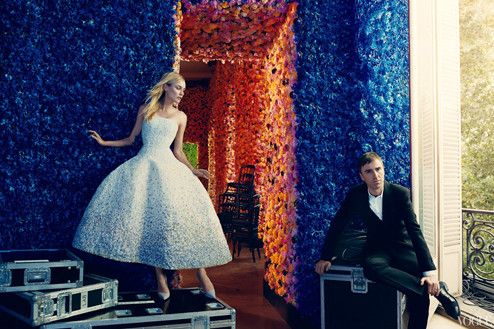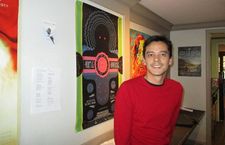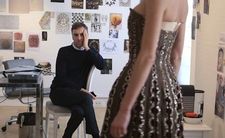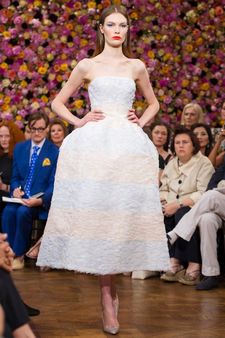 |
| Dior And I: "It has to be a little mysterious and enigmatic." |
Frédéric Tcheng, co-producer and co-editor of the fashion documentary Valentino: The Last Emperor and co-director of Diana Vreeland: The Eye Has To Travel, brings his beautifully evocative Dior And I (Dior Et Moi) to the Tribeca Film Festival where it will have its World Premiere. The haute couture ateliers of the House of Dior in Paris are haunted by the spirit of the founder, Christian Dior, who, in 1947, revolutionised the world of fashion with the "New Look". Enter Raf Simons, the Belgian designer, often mis-labeled "minimalist" who came from furniture design, to menswear, to Jil Sander.
Anne-Katrin Titze: Cinema is always about haunting, about the past coming back. In your film especially, you have the past haunting the present on many levels in Dior and I.
55 years later, Christian Dior's portraits still loom in every corridor.
 |
| Dior And I director Frédéric Tcheng: "While we were shooting the film you could physically sense the presence of Christian Dior." Photo: Anne-Katrin Titze |
Frédéric Tcheng: That was a theme that I was really interested in. While we were shooting the film you could physically sense the presence of Christian Dior. You couldn't walk ten feet in a corridor without there being a picture of Christian Dior or of his dresses from the Fifties. And everyone is talking about Mr. Dior - what he would have wanted, what he did. It's very strange.
AKT: You've worked on other fashion documentaries, on Diana Vreeland and the one on Valentino. So you've seen many different ateliers and you're saying that it is really an exception that Dior [who died in 1957] is so haunting? Valentino, of course is still very much alive.
FT: Yeah, Valentino's still there. I co-produced and co-edited it. It's a very different situation. The other thing about haunting, when I was editing the film after I shot in Paris I came back to New York to edit and I was interested in this concept of ghosts and apparition and the link to cinema.
I picked up this book that my friend Omar Berrada, who did the voice of Christian Dior, recommended. He is a poet and a translator and he knows a lot about literature and he told me about this book called Phantasmagoria by Marina Warner that talks about spirits and ghosts and the link to cinema and photography. How people at the beginning were afraid that photography would steal your soul. Those ideas were in my head and it was very important to me that the film bring Christian Dior back to life in a way. For him to really play a role in the present as opposed to just be 'this is the past of the house.'
When I tried to imagine what Raf Simons was feeling, there needed to be some conflict between the present and the past. I wanted Dior to be a towering shadow that Raf needed to overcome. He needed to find his own voice beyond that shadow.
 |
| Frédéric Tcheng on the House of Dior: "When I tried to imagine what Raf Simons was feeling, there needed to be some conflict between the present and the past." |
AKT: And you have a double of that struggle in Christian Dior himself, who, in his memoir speaks of his designing self as a siamese twin. He is already haunted by his famous shadow. You mentioned the voice-over, which you do not identify right away. What were your thoughts about that?
After the war, so Dior explained in his memoir, quoted in voice-over, women had enough of looking like soldiers with broad shoulders and boxy jackets, they longed to look like flowers, with "tiny waists above skirts that blossomed like corollas."
FT: It was a big question in the editing room. I wanted to avoid that kind of on-the-nose telling people exactly what it is. I like the confusion. Because if you hear a ghost's voice, of course you don't know where it's coming from. It has to be a little mysterious and enigmatic.
AKT: Speaking of omissions. I liked how sparsely you used music.
FT: You thought I used little music? I thought I used a lot of music.
AKT: So often documentaries overdo it with telling the spectator what to feel. I didn't get that from Dior And I.
FT: That's nice. Thank you. The composer Ha-yang Kim, she's very talented, more of an avant-garde cellist and composer. We talked a lot about dissonance and atonal music, something that wasn't really set in one direction or another. Something more fluid that would go from scary to sentimental, back to something that was much more enigmatic. She composed this beautiful score - sometimes it takes your breath away, sometimes it's dissonant and never settled.
AKT: The music is very delicately placed.
FT: On the other side, we had the composer compose music that was mostly linked to Christian Dior, a kind of Christian Dior theme and by the end it becomes Raf's theme. It moves from Christian Dior to Raf which is the trajectory of the film also. To go with Raf, we also chose music, minimal electronic music from the Nineties - the two themes become one in the end.
AKT: How did you get access to follow Raf Simons, taking over the House of Dior, for the eight weeks leading up to his very first haute couture show? Did you know each other before?
 |
| Frédéric Tcheng on scoring Dior And I with Ha-yang Kim: "We talked a lot about dissonance and atonal music, something that wasn't really set in one direction or another." Photo: Anne-Katrin Titze |
The documentary follows Simons' initial eight weeks as creative director at the helm of Dior, under pressure to produce his first ever haute couture collection in less time than ever.
FT: No, I didn't know Raf. I didn't meet Raf until very late in the process. The last film that I worked on, the Diana Vreeland film, I met people at Dior, namely Olivier Bialobos, who is the head of communications. He is in the film, helping Raf prepare the last stages of the show. Olivier was invited to a private screening of Diana Vreeland and we met afterward and started discussing ideas and a way to collaborate. Dior was in the middle of, you know, in between John Galliano and…
AKT: …whatever was going to happen at the House [of Dior] after the scandal.
FT: Everybody was wondering, who is it going to be and how soon? He said, 'I don't even know, but it's going to be soon'. I told him [Bialobos] I was interested in doing a film, not a video or something short. I thought there was potential for a real feature film.
AKT: And there's another ghost, a living one this time. Galliano is the unspoken ghost of the recent past haunting the film.
In part 2 of our conversation, Frédéric Tcheng reveals the role David Fincher, Todd Haynes, Jean-Luc Godard, Claire Denis and Olivier Assayas played in the making of Dior And I. And a glimpse of Raf Simons' House of Dior haute couture collection in Mademoiselle C.
Tribeca Film Festival public screenings: Thursday, April 17, 6:30pm – SVA Theater 1; April 19, 3:00pm – Bow Tie Cinemas Chelsea 7; April 22, 9:00pm – Bow Tie Cinemas Chelsea 7; April 25, 9:00pm – AMC Loews Village 7 – 1





















